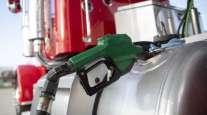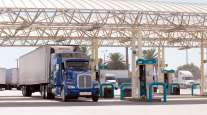Staff Reporter
Rep. Earl Blumenauer Pitches User Charge to Spur Infrastructure Funding

WASHINGTON — Road user charges, manifested in the form of a miles-based user fee (MBUF), are the best alternative for sustainable infrastructure funding, according to Rep. Earl Blumenauer (D-Ore.).
The MBUF system tabulates how far a vehicle has traveled and charges the vehicle based on that distance. Blumenauer delivered keynote remarks at the Mileage-Based User Fee Alliance’s annual national conference June 20. The alliance is a nonprofit organization made up of government, business, academic and transportation policy leaders to conduct outreach on the potential for MBUF as an alternative for future funding.
RELATED: MBUF pilot program leaders share lessons learned
Blumenauer recommended raising the fuel tax until road user charges can replace it entirely. He pointed out that more than half of the states have raised their fuel taxes in the past few years.
“I want to replace the gas tax with a revenue source that is sustainable. The road user charge is the simplest and most effective sustainable funding option,” Blumenauer said. “This is something that is within our capacity.”
Great keynote by @repblumenauer & engaging panels today - 2018 @MBUFA Conference #mbuf #vmt #gastax #ruc pic.twitter.com/7nL8XNYRVG — MBUFA (@MBUFA) June 20, 2018
The federal fuel tax, which supports the Highway Trust Fund, has stagnated at 24.4 cents a gallon for diesel and 18.4 cents a gallon for gasoline since 1993. Sustaining the Highway Trust Fund, which assists states with maintenance and construction projects, remains a pressing concern for legislators and transportation officials. Improvements in fuel consumption and shifting driving habits contribute to the account’s steady decline, prompting several general fund transfers in recent years to maintain its solvency.
Blumenauer recognized that a number of “odd dogs and cats,” such as vehicle registration and electric vehicle fees, have been introduced to prop up the thinning stream of revenue flowing from the federal fuel tax. He said the federal government needs to play a role in shifting toward a new source of funding.
“Sea change understates the challenge,” Blumenauer said. “One of most frustrating things has been that we’re stuck. It’s not even stuck in neutral. We’ve been going backwards.”
Blumenauer, who sits on the House Ways and Means Committee, said there is a dearth of witnesses who testify on transportation finance. For example, he said the committee has held 393 hearings over the past 7½ years. Over the course of those hearings, one witness testified for five minutes on this subject.
If Democrats regain control of the House this November, Blumenauer said he aims to multiply opportunities for members of Congress to learn about and discuss transportation funding. He said he and his colleagues Rep. Peter DeFazio (D-Ore.) and Rep. Richard Neal (D-Mass.) want to set aside a month or two with a special subcommittee on transportation finance.
He said potential witnesses would include representatives of the U.S. Chamber of Commerce, labor groups and the trucking industry.
“We [would] start setting aside the vast array of people who have skin in this game to come to the table and make their case,” Blumenauer said. “We could have 50 witnesses making a case within the first month.”
Several organizations, including the National Governors Association and the National Conference of State Legislatures, are facilitating discussions for government agencies that want to know more about MBUF. Garrett Eucalitto, program director of NGA’s environment, energy and transportation division, said states call him to ask what their neighbors are doing.
Blumenauer encouraged these discussions — and the states that already have forayed into MBUF pilot programs.
“I want you to be excited because you are truly doing the Lord’s work,” Blumenauer said. “We cannot go another two or four years down this path being stuck in neutral. Bring this puppy home.”




